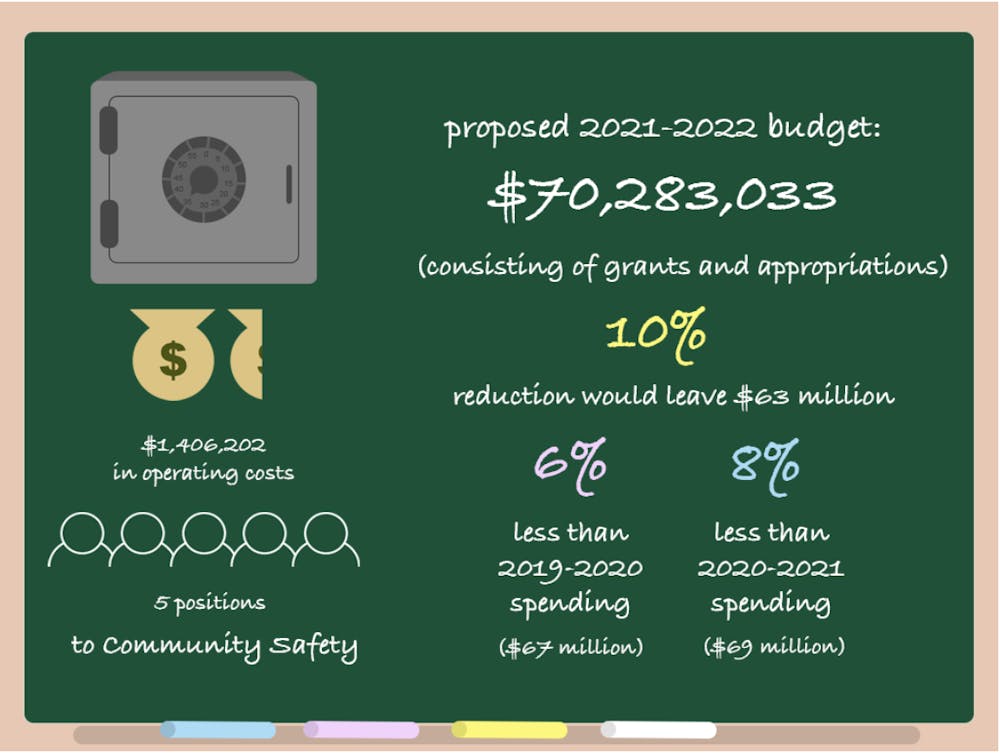Amid continued discussions surrounding police funding nationwide, the Durham City Council is poised to create a new safety division with potential cuts to the Durham Police Department.
The Community Safety Department will “work to enhance public safety through community-centered approaches to prevention and intervention,” according to the proposed budget for the 2021-2022 fiscal year. It will also house other local initiatives, such as Bull City United, to reduce community violence.
The proposed changes come as the city faces a shortage in emergency communications staff and DPD officers, a search for a new police chief and resident concerns about safety.
The department will begin with 15 full-time positions, including community responders, social workers and researchers. It is currently in a four-phase pilot stage, with the first stage—enhanced data collection for 911 calls involving mental health—already occurring. The department will pilot remote responses to non-urgent mental health calls over the summer before transitioning to in-person responses by fall 2021. Implementation of in-person responses to critical 911 calls is slated for spring 2022.
The pilot will be managed by an operations branch under a community responder manager, while another team will focus on evaluating the initiatives. That branch will include a research fellow from the Sanford School of Public Policy.
Interim Deputy City Manager Bertha Johnson told the Council at a May 27 work session that Sanford will compensate graduate students to form a research team focused on evaluating the pilots. Sanford Dean Judith Kelley confirmed in an email to The Chronicle that Sanford is collaborating with the city “based on a successful model from last year where our students served on Durham’s reopening task force.”
Ryan Smith, Sanford ‘14 and Duke’s liaison for the partnership, deferred comment until the budget is approved.
The plan for the CSD was shaped by recommendations from RTI International, which conducted focus groups with police officers and examined 911 calls made between October 2017 and October 2020 to identify trends in how Durham residents utilize emergency services. The audit found that the majority of calls did not result in arrests, and most welfare or mental health calls did not result in incident reports.
Police officers largely feel unequipped to address mental health calls, the report says, but feel that they need to respond because mental health situations are “highly unpredictable” and occasionally dangerous. Officers favored the co-responder method, in which a police officer responds alongside an unarmed responder, while advocates preferred models like CAHOOTS, in which crisis responders and EMS workers respond without police.
The research team suggested that officers receive more crisis intervention training and that crisis intervention officers and clinicians be staffed 24 hours a day, among other recommendations.
How will this affect other agencies?
DPD is presently the largest division of city government, receiving approximately $70.3 million in the 2020-2021 budget. The 2021-2022 budget allocates approximately $2.8 million to the CSD, with $1.4 million in operating costs originating from DPD. Those funds include money for city-contracted positions and community initiatives.
Johnson said that CSD also has additional funds from Bloomberg and FUSE Corps not reflected in the budget at the May 27 work session.
DPD’s budget is largely unchanged—a 0.1% reduction from the previous year, because the department received external funds during the pandemic—but the council pledged to cut up to 20 vacant positions if the budget passes June 21, and organizations are now calling to reduce DPD’s budget by 10%.
The calls were made by Durham Beyond Policing, which advocates for divestment from policing and reallocating funds to benefit Durham community members, and Durham For All, a progressive political organization co-founded by Durham Mayor Pro Tempore Jillian Johnson, at a virtual town hall. The organizations also want to see at least 10% of funding redirected from the Durham County Sheriff’s Office. The office had a budget of over $36 million in the 2019-2020 fiscal year.
The council is considering transferring five positions from DPD to the CSD, as well as another 15 later in the year. The council also discussed moving 20 positions per year, which would result in a total of 60 positions being cut from DPD within the next three years.
The Chronicle emailed Jillian Johnson a list of questions, including whether referrals to the CSD would override other jurisdictions, but did not receive a response in time for publication.
Editor's Note: This article has been updated to clarify that The Chronicle sent questions to Mayor Pro Tem Jillian Johnson.
Get The Chronicle straight to your inbox
Signup for our weekly newsletter. Cancel at any time.

Nadia Bey, Trinity '23, was managing editor for The Chronicle's 117th volume and digital strategy director for Volume 118.

